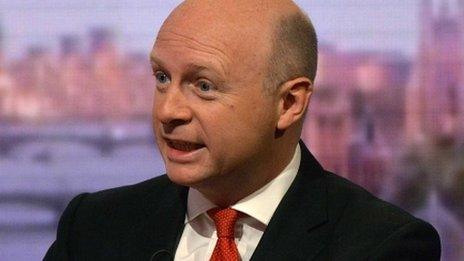Competing for the university vote
- Published

Like a monster re-awakening from a deep freeze, the debate about tuition fees in England and the future of universities seems to be coming back to life.
If there was a top 10 of education stories in the life of this Parliament, it would be hard to think of anything bigger than the ferocious dispute over raising tuition fees.
There were riots in the streets and rebellions among MPs. There was unprecedented interest in what had been the backwater of higher education funding.
But then it all went quiet. No one seemed to want to disturb the sleeping dragon.
The calm seems to be being broken, as universities are rapidly emerging as a political battleground, with competing visions.
Aspirational vote
Political parties like to align themselves with people's aspirations - and for more families than ever universities are a significant aspiration.
One lesson of the fee increase has been that there is a deep-rooted, rising demand for higher education. Despite trebling fees, after a brief dip, applications are almost undiminished, with every sign of long-term growth.
Record numbers will be starting university this autumn.
But alongside this big social change there is anxiety about affordability.
This week Labour has called for a more diverse higher education system, with more options for young people who do not want a traditional three year academic degree.
There are proposals for technical universities, promoting links with industrial research, where people can "learn while they earn".
Universities spokesman Liam Byrne has raised the spirit of the 1960s and the "white heat of technology", setting out a higher education system which would harness the hi-tech digital industries to support a high-wage economy.
Unlimited places
The Conservatives are also making a strong play on higher education, positioning themselves as the party of university expansion.
They have announced plans to scrap limits on university places, tapping into the ambitions of parents for their children.
Alongside these optimistic plans is the much tougher and still unanswered question about what will happen to tuition fees.
Labour's last position was to reduce fees to £6,000. There might be some more clarity on this at the party conference - and maybe an even bolder position on reducing fees further in the longer term.
But any such reduction will produce a growl of concern from universities who will worry about a looming funding gap.
The Conservative plan to remove the limit on university places is also worrying universities, who are concerned that it will mean more students with same funding being stretched more thinly.
And would a move to a less regulated market in places mean a less regulated market in fees? There are already rumblings that top universities would like to be able to charge much more than the £9,000 limit.
It isn't just the headline figure that will need to be reconsidered. The repayment terms on student loans are an important part of the jigsaw.
In the angry battle over raising tuition fees there were strenuous efforts to damp down the impact.
And it might be that this current phase of £9,000 fees on generous terms will be seen as something of a phoney war - and that a much tougher set of repayment terms will apply to future students.
Such debates are much more difficult territory for the Lib Dems, who became the lightning rods for so much of the anger over tuition fees.
But the future of universities, as a touchstone of opportunity and ambition, looks like it could be an increasingly important dividing line.
- Published28 August 2014

- Published10 June 2014
